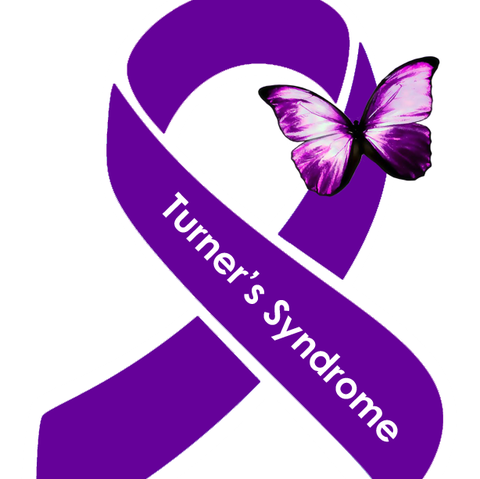Hey beautiful Human,
If you're reading this, you might have just received a Turner Syndrome diagnosis, know someone who has TS, or simply want to learn more about this condition. Whatever brought you here, thank you for taking the time to educate yourself. Knowledge is power, and understanding Turner Syndrome is the first step toward supporting those who live with it every day.
What exactly is Turner Syndrome?
Turner Syndrome (TS) is a chromosomal condition that affects approximately 1 in 2,500 females worldwide. It occurs when one of the two X chromosomes is partially or completely missing. While most females have two complete X chromosomes (46,XX), individuals with Turner Syndrome typically have only one complete X chromosome (45,X), though there are mosaic variations where some cells have the typical two X chromosomes.
This missing or altered chromosome affects development in various ways, but it's important to remember that TS manifests differently in each person. No two experiences are exactly the same.
Common Physical Characteristics
Women with Turner Syndrome may experience a range of physical features, though not everyone will have all of these characteristics:
Short Stature: One of the most common features of TS is shorter-than-average height. Without treatment, adult women with TS typically reach an average height of around 4 feet 8 inches. However, growth hormone therapy, when started early, can help girls with TS gain several additional inches.
Ovarian Insufficiency: Most girls with Turner Syndrome experience ovarian dysfunction, which can lead to absent or incomplete puberty and infertility. The ovaries may not develop properly or may deteriorate early in life. This often means that hormone replacement therapy is needed to initiate and maintain sexual development.
Heart Conditions: Approximately 30-50% of individuals with TS are born with heart defects, most commonly affecting the aorta and heart valves. Regular cardiac monitoring is essential throughout life.
Kidney Abnormalities: Some people with TS have structural differences in their kidneys, though these often don't cause symptoms. Regular monitoring helps catch any potential issues early.
Hearing Issues: Recurrent ear infections and hearing loss are more common in individuals with TS, particularly in childhood.
Thyroid Problems: Many women with TS develop thyroid conditions, particularly hypothyroidism, which requires monitoring and treatment.
Skeletal Differences: These may include a broad chest, widely spaced nipples, a short neck with extra skin folds (webbed neck), and arms that turn out slightly at the elbows.
Medical Management and Treatment
The good news is that with proper medical care and monitoring, individuals with Turner Syndrome can lead healthy, fulfilling lives. Treatment typically involves a multidisciplinary approach:
Growth Hormone Therapy: Starting in early childhood, growth hormone injections can help girls with TS achieve a taller adult height. This treatment usually continues until the growth plates close or an acceptable height is reached.
Hormone Replacement Therapy (HRT): Estrogen therapy is typically started around the age of puberty to initiate breast development and other secondary sexual characteristics. Later, progesterone is added to maintain bone health and regulate menstrual cycles.
Cardiac Care: Regular echocardiograms and blood pressure monitoring are crucial. Some individuals may need surgical intervention for heart defects.
Fertility Options: While most women with TS cannot conceive naturally, advances in reproductive medicine offer options including egg donation, embryo donation, and in some cases, fertility preservation if ovarian function is detected early.
Regular Monitoring: Ongoing care includes monitoring for thyroid function, glucose metabolism (as there's an increased risk of diabetes), bone density, hearing, and vision.
The Emotional and Psychological Journey
Living with Turner Syndrome isn't just about managing physical health—it's also about navigating the emotional challenges that come with the diagnosis. Many girls and women with TS experience:
- Anxiety about their diagnosis and what it means for their future
- Concerns about fertility and relationships
- Self-esteem issues related to physical differences
- Social challenges, particularly during adolescence
- Learning differences, particularly with spatial reasoning and mathematics
Mental health support, counseling, and connecting with others who have TS can make an enormous difference. This is where community becomes vital.
Living Well with Turner Syndrome
Despite the challenges, women with Turner Syndrome achieve incredible things. They become doctors, teachers, artists, athletes, entrepreneurs, and everything in between. They fall in love, build families (through various paths), pursue their passions, and live rich, meaningful lives.
The key is early diagnosis, proper medical care, strong support systems, and self-advocacy. Learning about your condition, staying on top of your health, and connecting with others who understand your journey makes all the difference.
How You Can Help: Supporting Turner Syndrome Research and Awareness
Organizations like the Turner Syndrome Foundation work tirelessly to support individuals and families affected by TS. They provide:
- Educational resources for newly diagnosed families
- Support groups and community connections
- Funding for research into better treatments and understanding of TS
- Advocacy for improved healthcare access and insurance coverage
- Conferences and events that bring the TS community together
Research into Turner Syndrome is ongoing, and every donation helps fund studies that could lead to better treatments, improved quality of life, and perhaps one day, even more options for fertility preservation.
Your donation—whether £5, £20, or £100—makes a real difference. It funds research that could help a newly diagnosed child access better treatments. It provides resources for families navigating this journey. It creates awareness that helps break down stigma and misunderstanding.
Donate to TS Foundation →https://turnersyndromefoundation.org/donate/
If you can't donate, you can still help by:
- Sharing information about Turner Syndrome on social media
- Participating in awareness events
- Supporting individuals and families you know who are affected by TS
- Educating others when you hear misconceptions about the condition
Connect with TS and Me
At TS and Me, I'm creating a space where people with Turner Syndrome can find support, access resources, and discover beauty and skincare recommendations that help us feel our best. Whether you're newly diagnosed, have been living with TS for years, or are a parent, partner, or friend of someone with Turner Syndrome, you're welcome here.
Through this blog and platform, we can raise awareness, support research, and show the world that living with TS doesn't define us—it's simply part of our unique story. You're not alone on this journey.
For more information, resources, and to stay connected, visit: http://TSandMe.com
Let's make a difference together.
Fly Boldly,
Teisha
My difference is my light
Support Our Mission
💜 Turner Syndrome Foundation
Support research, resources, and advocacy for the TS community nationwide.
Donate to TS Foundation →https://turnersyndromefoundation.org/donate/
✨ TS&ME Forward Fund
Help us continue creating content, building community, and supporting TS warriors directly.
Contribute to TS&ME → https://www.justgiving.com/crowdfunding/teisha-johnston-1

